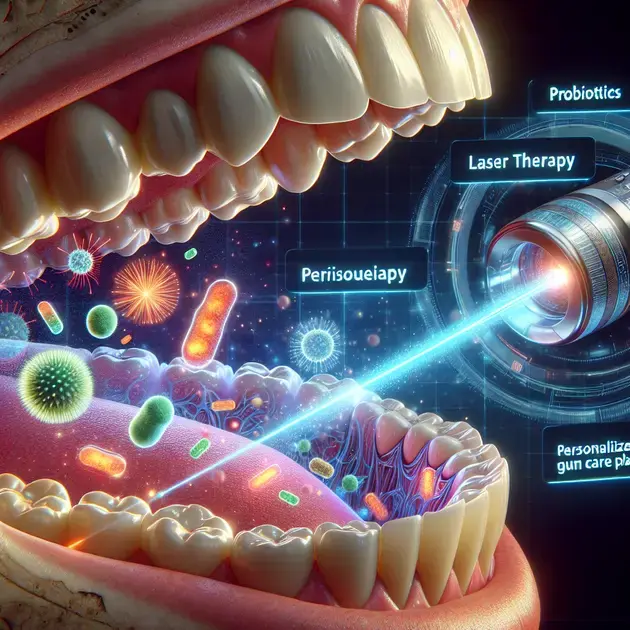Looking for effective medication for periodontitis? You’ve come to the right place. This comprehensive guide will cover everything you need to know about treatment options for this common dental condition.
Periodontitis is a serious gum infection that damages the soft tissue and destroys the bone that supports your teeth. Without proper treatment, it can lead to tooth loss and other health complications. In this guide, we will explore the most effective medications and therapies available to combat periodontitis and restore your oral health.

Effective Treatment Options for Periodontitis
Periodontitis is a serious condition that affects the gums and can lead to tooth loss if left untreated. Fortunately, there are several effective treatment options available to manage and combat this condition. One of the most common treatments is professional deep cleaning, also known as scaling and root planing. This procedure involves removing plaque and tartar from the teeth and roots to prevent further damage to the gums.
Another effective treatment option for periodontitis is antibiotic therapy. This involves taking antibiotics to help eliminate the bacteria causing the infection in the gums. Your dentist may prescribe oral antibiotics or apply antibiotic gel directly to the affected areas to help reduce inflammation and promote healing.
Surgery may be necessary for more severe cases of periodontitis. Procedures such as flap surgery or bone grafting can help reduce pocket depths in the gums and restore damaged bone tissue. Your dentist or periodontist will determine the best course of action based on the severity of your condition.
In addition to professional treatments, maintaining good oral hygiene at home is essential for managing periodontitis. Brushing and flossing regularly, using an antiseptic mouthwash, and attending regular dental check-ups can help prevent the progression of the disease.
If you are looking for more information on effective treatment options for periodontitis, websites like the American Academy of Periodontology (perio.org) or the Mayo Clinic (mayoclinic.org) offer valuable resources and guidance on managing this condition.
Understanding the Importance of Medication
Medication plays a crucial role in the treatment of periodontitis, helping to control infection, reduce inflammation, and promote healing in the gums. Antibiotics are commonly prescribed to combat the bacterial infection that causes periodontitis. They can be taken orally or applied directly to the affected areas, depending on the severity of the condition.
Anti-inflammatory drugs are also used to help reduce swelling and pain in the gums. Over-the-counter pain relievers such as ibuprofen or prescription-strength medications may be recommended to manage discomfort during treatment.
Prescription mouthwashes containing antimicrobial agents can help control bacterial growth in the mouth and reduce the risk of further infection. These mouthwashes are often used in conjunction with other treatments to maximize their effectiveness.
It is important to follow your dentist or periodontist’s instructions when taking medication for periodontitis. Make sure to take the prescribed dosage at the right times and finish the entire course of antibiotics to prevent the infection from returning.
For more detailed information on the importance of medication in treating periodontitis, websites like the National Institute of Dental and Craniofacial Research (nidcr.nih.gov) or the Centers for Disease Control and Prevention (cdc.gov) provide helpful resources and guidance on this topic.
Holistic Approaches to Combating Periodontitis
In addition to traditional treatment options, holistic approaches can also be effective in managing periodontitis. Some natural remedies and lifestyle changes may help improve gum health and support overall oral health.
Practicing good nutrition is essential for gum health. Eating a balanced diet rich in vitamins and minerals, particularly vitamin C and calcium, can help strengthen the gums and prevent periodontal disease.
Stress management techniques such as yoga, meditation, or deep breathing exercises may help reduce inflammation and promote healing in the gums. Stress has been linked to increased risk of periodontitis, so finding ways to relax and unwind can benefit both your oral and overall health.
Herbal supplements like green tea extract or aloe vera gel may have anti-inflammatory properties that can help reduce gum inflammation and support healing. Consult with your healthcare provider before incorporating any herbal remedies into your treatment plan.
Regular physical activity can also have a positive impact on gum health. Exercise helps improve circulation and immune function, which can in turn support the body’s ability to fight off infections and promote healing in the gums.
Websites like the Holistic Dental Association (holisticdental.org) or the National Center for Complementary and Integrative Health (nccih.nih.gov) offer valuable information on holistic approaches to combating periodontitis and promoting overall oral health.

Understanding the Role of Medication in Periodontitis Management
Periodontitis is a serious gum infection that can lead to tooth loss and other health complications if left untreated. In addition to regular dental care, medication plays a crucial role in managing and treating periodontitis. Antibiotics are commonly prescribed to combat the bacteria causing the infection and reduce inflammation in the gums. These medications can help stop the progression of the disease and promote healing.
It’s important to follow your dentist’s instructions when taking medication for periodontitis. Proper dosage and duration of treatment are essential for the medication to be effective. In some cases, your dentist may recommend a combination of antibiotics to target different types of bacteria in the gums. It’s crucial to complete the full course of medication to prevent the infection from recurring.
While medication is an important component of periodontitis management, it is not a standalone treatment. Maintaining good oral hygiene habits, such as regular brushing and flossing, is essential for preventing and managing gum disease. Your dentist may also recommend lifestyle changes, such as quitting smoking and eating a balanced diet, to support your overall oral health.
In conclusion, medication plays a vital role in the management of periodontitis by fighting infection and reducing inflammation in the gums. When used in conjunction with proper dental care and healthy lifestyle habits, medication can help control the disease and promote gum health.
The Connection Between Gum Health and Overall Well-Being
The health of your gums is closely linked to your overall well-being. Research has shown that gum disease can increase the risk of various health conditions, including heart disease, diabetes, and stroke. When the gums are infected, bacteria can enter the bloodstream and affect other parts of the body, leading to systemic inflammation and potential health issues.
Maintaining good gum health is essential for preserving your overall well-being. Brushing and flossing regularly, as well as visiting your dentist for check-ups, are simple yet effective ways to prevent gum disease. In addition to oral hygiene practices, a healthy diet rich in fruits and vegetables can provide the nutrients needed to support gum health.
Regular dental cleanings and exams are also crucial for detecting and treating gum disease in its early stages. Your dentist can recommend appropriate treatments, such as deep cleanings or medication, to manage the infection and prevent complications. By prioritizing gum health, you are not only maintaining a healthy smile but also safeguarding your overall health.
Innovative Strategies for Enhanced Oral Health
Advancements in dental technology have paved the way for innovative strategies to enhance oral health. One such strategy is the use of probiotics to promote a healthy balance of bacteria in the mouth. Probiotic supplements or foods can help reduce harmful bacteria that cause gum disease, leading to improved gum health and overall well-being.
Another innovative approach to oral health is the use of laser therapy for gum disease treatment. Laser technology can target and eliminate bacteria in the gums with precision, reducing the need for invasive procedures and promoting faster healing. This minimally invasive treatment option is becoming increasingly popular for managing gum disease.
Furthermore, personalized oral care plans are gaining traction as a way to tailor dental treatment to individual needs. By considering factors such as genetics, lifestyle habits, and overall health, dentists can create customized plans to optimize oral health outcomes. This personalized approach can lead to more effective results and better long-term oral health.
Overall, embracing innovative strategies such as probiotics, laser therapy, and personalized care plans can significantly enhance oral health outcomes. By staying informed about these advancements and working closely with your dentist, you can achieve a healthier smile and improved overall well-being.
Conclusion
Understanding the vital role of medication in periodontitis management is crucial for combating gum infection effectively. Antibiotics are essential in combating bacteria, reducing inflammation, and promoting healing. Adhering to your dentist’s instructions on dosage and duration is key to the medication’s effectiveness. Completing the full course is necessary to prevent the infection from recurring. However, medication is just one aspect of periodontitis management; maintaining good oral hygiene habits and lifestyle changes are equally important for preventing and managing gum disease.
The connection between gum health and overall well-being cannot be overstated. Research has linked gum disease to various serious health conditions, underscoring the importance of maintaining good gum health. Regular brushing, flossing, and dental check-ups are simple yet effective ways to prevent gum disease. A diet rich in fruits and vegetables plays a vital role in supporting gum health. Through regular dental cleanings and exams, early detection and appropriate treatments can help manage infections and prevent complications, safeguarding both your smile and overall health.
Embracing innovative strategies such as probiotics, laser therapy, and personalized care plans can significantly enhance oral health outcomes. Probiotics promote a healthy balance of mouth bacteria, while laser therapy targets and eliminates bacteria with precision, reducing the need for invasive procedures. Personalized care plans tailored to individual needs optimize oral health outcomes, considering factors like genetics and lifestyle habits. By staying informed and collaborating closely with your dentist, you can achieve a healthier smile and improved well-being, benefiting from these advancements in oral health care.



